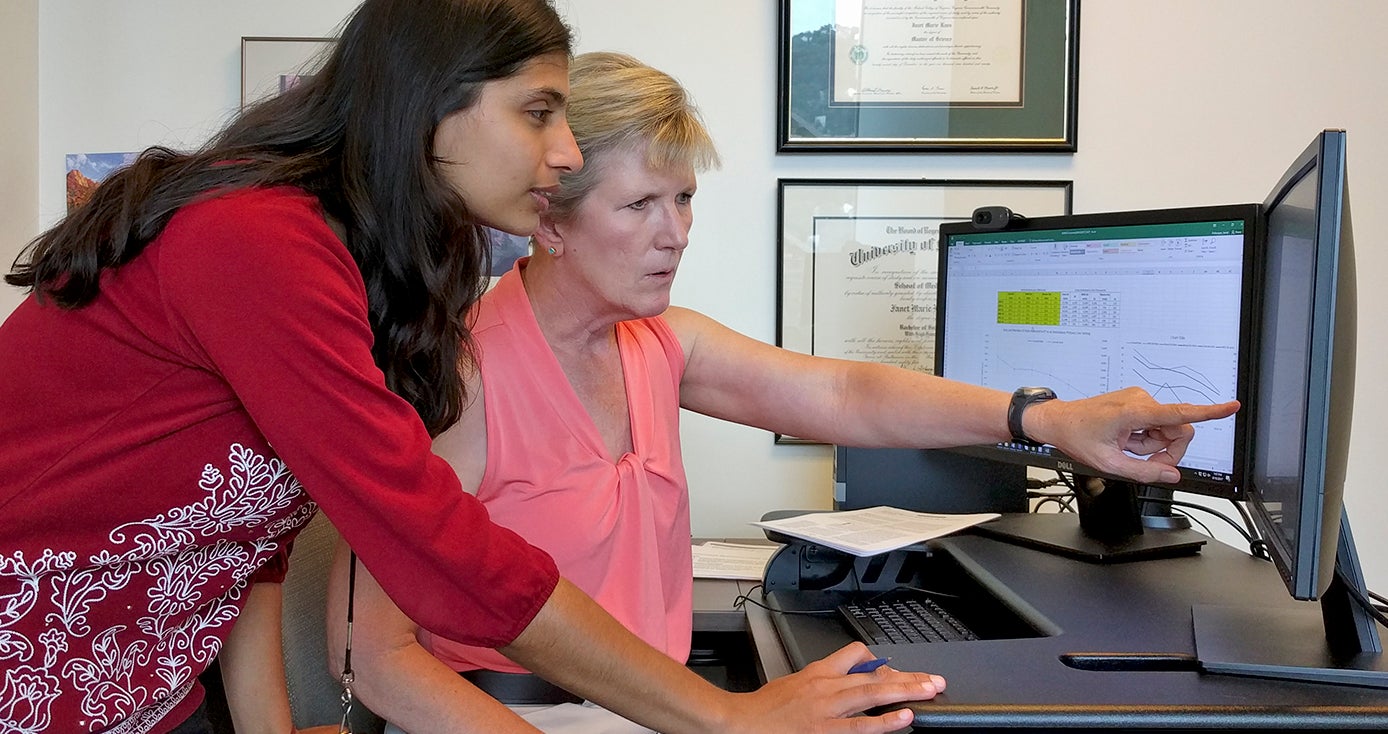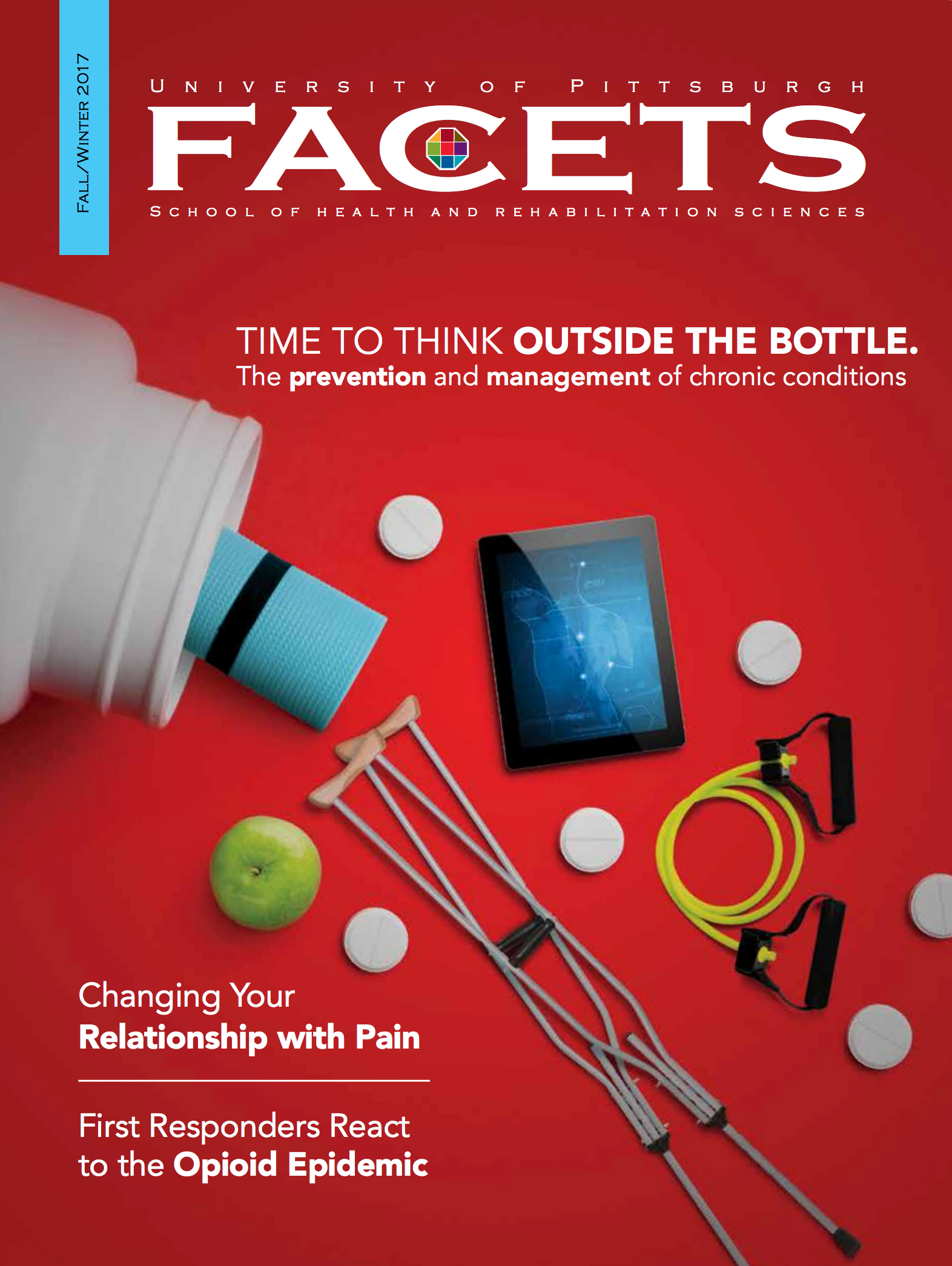
Subscribe to Pittwire Today
Get the most interesting and important stories from the University of Pittsburgh.Physical Therapists Use Big Data to Increase Referrals, Decrease Hospital Readmissions
This story is adapted from the fall/winter issue of FACETS, the magazine from the School of Health and Rehabilitation Sciences.
Janet K. Freburger likes to look at the big picture. That’s why she pursued a career in health services research. “Looking at huge amounts of data has a lot of implications for health policy,” noted Freburger.
It also informs patient care.
When she joined the Department of Physical Therapy as professor in January 2017, Freburger immediately began summarizing the results of a study that she began as a researcher at the University of North Carolina at Chapel Hill.
The objective of her study, which examined Medicare data from more than 24,000 individuals over a four-year period, was to determine if patients who receive physical and occupational therapy in a timely manner after a stroke hospitalization have fewer hospital readmissions.
“Advances in the care of stroke have reduced stroke mortality by approximately 40 percent in recent decades,” said Freburger. “But residual impairments in stroke survivors remain high and impact the patient’s quality of life.”
She added that motor and cognitive impairments also increase the risk of hospital readmission.
“Our work has shown that individuals who receive rehabilitation care in the first 30 days following discharge home are less likely to be readmitted to the hospital in the subsequent 30 days,” said Freburger. “Our findings also suggested that the earlier a patient receives care and the more intensive the care is in regard to number of visits, the less likely he or she is to be readmitted.”
The researchers found compelling evidence that the ratio of registered nurses to patients and the supply of primary care providers in the patient’s county of residence were positively associated with receiving care in both acute and community settings. These factors also had a positive impact on the continuity of care.
“The goal of physical therapy is always to keep patients physically active and managing their own care,” said Freburger. But she noted that the study showed underutilization of rehabilitation care in community settings after stroke.
“As physical therapists, we need a better understanding of why patients aren’t receiving needed rehabilitation care after a hospitalization so we can figure out ways to improve access to physical therapy,” Freburger said.
Right now, Freburger and postdoctoral associate Samannaaz S. Khoja (SHRS ’09G, ’16G) are examining 12 years of data from a large national dataset to understand factors associated with physician referral to physical therapy. Many insurance companies still require a physician referral for patients to receive physical therapy, so physicians play a key role in directing patients to physical therapists.
There were a few surprises along the way.
According to Khoja, they were surprised to see that the rate of physician referral to physical therapy declined over time. “As we continue to analyze data, we’re trying to understand why there was a drop,” said Khoja. “We’re now looking at trends over that 12-year span.”
Khoja said they found many non-clinical reasons for the decline in referrals. Some were related to racial and socioeconomic disparities, while some reflected differences in insurance and the specialties of the referring — or non-referring — physicians.
“We don’t want under-referral of therapy, but we also don’t want physicians over-referring patients,” said Khoja. “It will take future studies to determine how we can optimize referrals.”
“We’re always trying to improve the quality of care at a lower cost,” said Freburger. “Health services research can help us find the answer.”
“Dr. Freburger’s work in health services research is critical in order to demonstrate the value of physical therapy, particularly in managing people with chronic health care conditions,” said School of Health and Rehabilitation Sciences Dean Anthony Delitto. “Likewise, all of the professions within SHRS have an obligation to identify that sweet spot between under- and over-referral. Consequently, health services research, such as the work by Dr. Freburger, has emerged as one of the top research priorities in our recent strategic planning process.”



